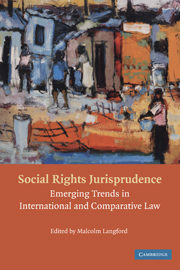Book contents
- Frontmatter
- Contents
- Foreword – Philip Alston
- Preface
- PART ONE OVERVIEW
- PART TWO SELECT NATIONAL JURISDICTIONS
- 4 South Africa
- 5 India
- 6 South Asia
- 7 Colombia
- 8 Argentina
- 9 Brazil
- 10 Venezuela
- 11 Canada
- 12 The United States
- 13 Hungary
- 14 France
- 15 United Kingdom
- 16 Ireland
- PART THREE REGIONAL PROCEDURES AND JURISPRUDENCE
- PART FOUR INTERNATIONAL HUMAN RIGHTS PROCEDURES AND JURISPRUDENCE
- PART FIVE SPECIAL TOPICS
- Notes on Contributors
- Table of Authorities
- Index
- References
12 - The United States
A Ragged Patchwork
Published online by Cambridge University Press: 05 June 2012
- Frontmatter
- Contents
- Foreword – Philip Alston
- Preface
- PART ONE OVERVIEW
- PART TWO SELECT NATIONAL JURISDICTIONS
- 4 South Africa
- 5 India
- 6 South Asia
- 7 Colombia
- 8 Argentina
- 9 Brazil
- 10 Venezuela
- 11 Canada
- 12 The United States
- 13 Hungary
- 14 France
- 15 United Kingdom
- 16 Ireland
- PART THREE REGIONAL PROCEDURES AND JURISPRUDENCE
- PART FOUR INTERNATIONAL HUMAN RIGHTS PROCEDURES AND JURISPRUDENCE
- PART FIVE SPECIAL TOPICS
- Notes on Contributors
- Table of Authorities
- Index
- References
Summary
INTRODUCTION
The United States government is infamously reticent to recognise economic and social rights on the international stage. Domestically, these rights are not currently recognised by the national constitution, and their enjoyment is primarily determined by legislative fiat. With a few significant exceptions, the concept of economic and social rights has not taken root in the popular imagination, making legislative assaults on social protection possible without any serious political costs.
Given the socio-economic indicators in the United States, which include the highest rate of child poverty among wealthy countries, and severe gaps in access to health care, there is a pressing need to develop stronger jurisprudence in this arena so as to buttress basic levels of protection against perpetual changes in the political winds. This article reviews avenues used by advocates to develop such jurisprudence, as well as emerging and promising long-range strategies. In particular, Section 2 outlines the history of economic and social rights in the United States, Section 3 reviews the federal constitutional framework in relation to these rights, and Section 4 explores work to date at the sub-national level in individual state constitutions.
HISTORY OF ECONOMIC AND SOCIAL RIGHTS IN THE UNITED STATES
It is generally agreed that the drafters of the U.S. Constitution were primarily concerned with curbing the abuse of government power.
- Type
- Chapter
- Information
- Social Rights JurisprudenceEmerging Trends in International and Comparative Law, pp. 230 - 249Publisher: Cambridge University PressPrint publication year: 2009
References
- 3
- Cited by

